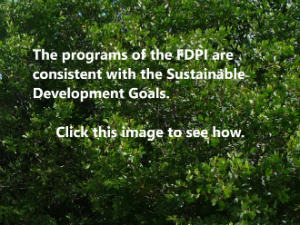By Floyd Homer October 16, 2020
This article demonstrates how advocacy and public awareness can influence public policy and catalyse action on behalf of farmers and farming communities. Action and advocacy was designed around a short documentary, Farmers Challenge, which highlights the plight of farmers in the small community of Plum Mitan in east Trinidad, of the twin island State of Trinidad and Tobago. Plum Mitan is a microcosm of the farming sector in Trinidad, and therefore a perfect case study to demonstrate the impact of policy, or lack thereof, on resource-poor small farms in small island developing states (SIDS). The video is intended to build awareness of the challenges and needs of farmers and to stimulate action to address the range of issues identified.
It all began when a group of farmers, affected by disastrous flooding in 2018, sought intervention to create awareness of their never-ending cycle of losses due to flooding and neglected infrastructure. They explained that studies and consultancies were conducted time and again with no meaningful, timely or consistent action by the authorities responsible for the management of the infrastructure or the interests of the people.
My interest in supporting sustainable environmental practices and the belief that commerce and environmental sustainability are not mutually exclusive, motivated me to get involved. I co-opted the services of a locally awarded, two-time winning environmental documentary producer and we launched into developing the documentary that tells the story of farmers lives in this community. Our approach was to first involve the affected people in the production every step of the way.
During the course of the production, it became evident that remote rural territories like Plum Mitan can be greatly affected by seemingly simple policies. Such as those from regulatory bodies and institutions that do not have a full grasp of their misunderstanding of the industry that they are meant to support. Some form of common ground and facilitation for these seemingly invisible communities must be factored in when decisions are being made that affect the lives and livelihoods of these citizens.
When the first draft was completed, we sought consensus from the community and international reviewers. Unbeknownst to us, the video was sent to the Minister of Agriculture before the launch of the video with the farmers. However, that action resulted in a visit by the Minister with a full team of senior technocrats and administrators to the area to meet with the farmers, only days after the Minister saw the video. Following the visit by the Minister, a small team of senior ministry officials and farmers were delegated the task of preparing a plan for priority action within one week. It now remains to be seen how and when implementation will take place.
The identification and implementation of pragmatic solutions to sustaining livelihoods based on the local social, economic, environmental, and political cultures still remain a major challenge for island communities. This documentary was produced in an effort to help people better manage the natural resources on which their livelihoods depend.
An interesting observation by a reviewer was that there are many large technical reports on agriculture and development for the area done over the past two decades. However, these remain largely on the shelves in offices of ministry officials. This short video documentary, Farmers Challenge, shared widely through social media was able to get immediate initial action with the engagement of the key stakeholders.
So perhaps there is an opportunity for technical reports to be converted into short video documentaries and shared widely through social media, to build awareness, but also to assist in accountability among state agencies.
Floyd Homer, Ph.D. is a Director of the Multicrop Facility Ltd. based in Trinidad and Tobago, and an active farmer.
Disclaimer
The perspectives and positions in the article are solely those of the author(s), and do not reflect the views or positions of the Foundation for Development Planning, Inc., its board of directors, its staff, its associates, or its collaborating partners.

No Comments Yet - be the First!